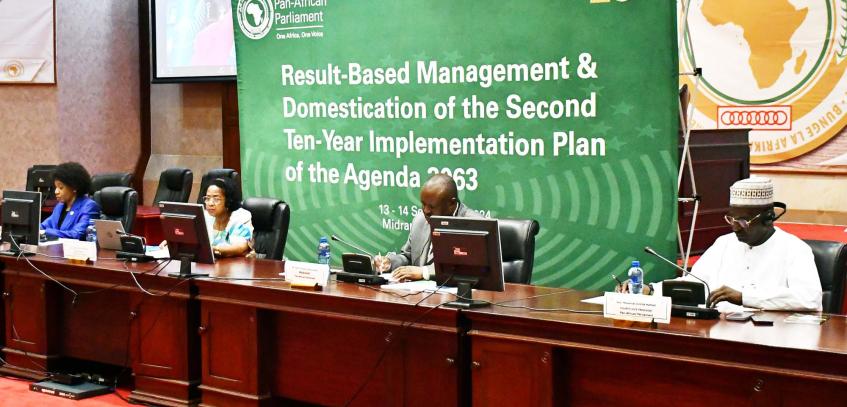The Pan-African Parliament (PAP) has launched a two-day workshop aimed at enhancing its capacity to align with the African Union’s (AU) Second Ten-Year Implementation Plan (STYIP) of Agenda 2063 (2024-2033). The workshop focuses on Result-Based Planning, Management, and Budgeting to strengthen the domestication and implementation of the AU’s strategic objectives across member states.
In a bold move to accelerate the vision of a prosperous, integrated, and peaceful Africa, the African Union has charted a course with its STYIP for Agenda 2063. From 2024 to 2033, this plan introduces seven "Moonshots" – ambitious goals aligned with the aspirations of Agenda 2063, the AU's blueprint for transforming Africa into a global powerhouse.
Among the key players in this transformative agenda is the PAP. However, unlike national parliaments with direct legislative powers, the Pan-African Parliament serves in an advisory and consultative capacity, creating unique challenges in demonstrating its impact on Africa’s development. Recognizing this, PAP resolved to hold a pivotal workshop from 13-14 September 2024 at its headquarters in Midrand, South Africa, to equip its members with the tools and knowledge needed to contribute effectively to the AU’s ambitious goals.
In her virtual address to the workshop, H.E. Dr. Monique Nsanzabaganwa, Deputy Chairperson of the African Union Commission (AUC), emphasized the critical role of the PAP in achieving Agenda 2063. She stressed the importance of result-based management, stating: "Results-based planning, budgeting, reporting, and management are no longer optional. They are central to achieving the transformative goals we’ve set under Agenda 2063."
Dr. Nsanzabaganwa highlighted PAP’s role in coordinating efforts across AU institutions, stating, "The PAP must play a cross-cutting role that amplifies our collective efforts. It is uniquely positioned to serve as a watchdog and advocate for the domestication and implementation of Agenda 2063’s goals across member states. Its oversight role must be enhanced." She also urged the PAP to take a leading role in communicating the benefits of Agenda 2063: "The PAP can be a powerful advocate for the AU’s agenda, helping to communicate its benefits to citizens and parliamentarians alike. Through its unique position, the PAP can ensure that Agenda 2063 is domesticated at the national level, turning continental aspirations into local realities. The PAP can act as a bridge between the AU and national governments, fostering stronger relationships to facilitate policy implementation."
Hon. Chief Fortune Charumbira, President of the PAP, described the workshop as a potential catalyst for meaningful change across the continent. He highlighted the workshop's role in providing insights into monitoring and reporting mechanisms necessary to track and demonstrate PAP’s contributions to AU goals. The President also noted that the workshop presents an opportunity to reposition the PAP within the AU’s architecture.
“As the AU transitions towards a result-based framework, particularly with the implementation of Agenda 2063 and its Second Decade, it is essential that the PAP adapts its approach to fully embrace this new paradigm. This workshop represents a pivotal step in bridging the knowledge gap among our members, many of whom are more familiar with the definitive mandates of national parliaments,” he said. He added: “By equipping our members with a solid understanding of result-based approaches, we are not only enhancing our alignment with the AU’s aspirations but also increasing our impact and visibility. Our aim is to better plan, budget, and report in ways that vividly demonstrate our contributions to the AU’s objectives, fostering greater accountability and effectiveness within our operations.”
The workshop highlights how PAP members can strengthen oversight, ensure effective resource use, and enhance the legislative role of the PAP in achieving the Moonshots set for Africa’s development. The training features presentations from AU experts, including the Office of Strategic Planning and Delivery (OSPD), offering participants practical solutions to drive the successful implementation of Agenda 2063 in their respective countries.
Key Highlights:
- Capacity Building: PAP members will receive training on result-based management approaches aligned with the aspirations of Agenda 2063, enabling them to enhance accountability and transparency in their roles.
- Accelerating Integration: A core focus will be placed on advancing the ratification and domestication of key AU legal instruments, including the PAP Protocol of 2014, which has seen slow progress.
- Strategic Alignment: Through interactive sessions, PAP members will develop a result-based plan for their activities, ensuring stronger contributions toward the AU’s strategic objectives.








